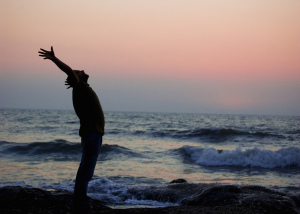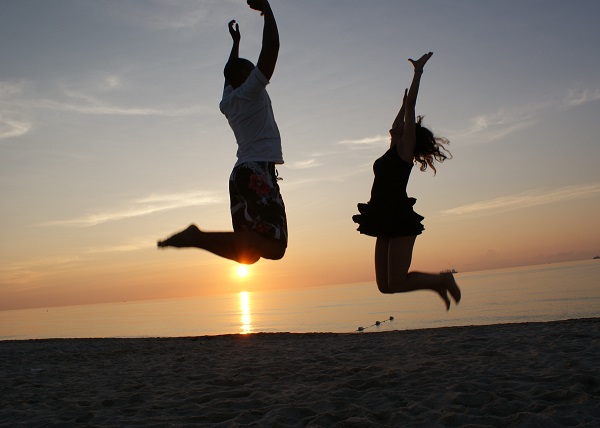Gone are the days when we should passively “fall” for one another. This year Kristen Hick challenges us to live fearlessly. Let’s rise in love, instead.
I think we’ve all done enough damage with this whole “falling” in love thing. Yes, the initial descent can feel pretty amazing, but oh, the inevitable collapse on the other side of that bliss, no matter how pure our initial intentions.
As a part of our year-long focus on Fearless Living, let’s choose another aim. This year let’s rise in love instead of fall.
For all the newcomers, this is the fourth month in a year-long series on how to live fearlessly. Our goal is to help each and every one of you become the superhero in your own life. Each month is designed to help you explore, process, practice, and (yes!) master an area of your life fearlessly. I invite you to check out previous months, in which I discussed a brief introduction to fearlessness, loving yourself fearlessly, and dating fearlessly.
With your new skills in the arenas of both self-love and dating, chances are good you may find yourself in the near future feeling those fuzzy warm tingles for someone special. I can’t think of a better time to help you approach the next stage of your budding relationships with new insight and guidance by exploring how to love fearlessly through rising in love.
Rising in Love? Will this feel as good as falling?
Here’s the problem, folks. “Falling” in love is another old and often enfeebling way of viewing the alleged “perks” of an intimate relationship. It can really start us off down the wrong path.
“Falling” in love all too often involves two people who previously stood independently collapsing into various levels of codependency, merging into the other, losing themselves for the sake and existence of the relationship. The two people assume a new identity: a “couple.” In this name of “love,” the partners become dependent upon one another, their expectations for happiness and comfort and security become entwined, their own preferences dimmed in the name of “compromise.”
“I love you, but I need you to do this and that and NOT do this other thing, so I know for sure you love me. I need you to be perfect, as you were in the beginning, or as I wanted to believe you were. I cannot generate happiness and contentment unless you behave in a way that pleases and affirms me.”
To teach you, then, how to “fall” in love fearlessly would be to teach you nothing at all about true fearlessness, nor would it teach you about true love.
Falling in love happens when one or both partners are afraid to exist independently, separately. Falling in love happens when you don’t trust yourself or your partner enough to stand grounded in your own personhood and love from a position of internal strength.
Origins of Falling in Love
Think back to February’s Living Fearless piece. What were your fears about loving yourself fearlessly? Do you recall what you realized from exploring the origins of loving yourself? What did your role models teach you about loving yourself? What messages were you given about how and how much to love yourself? All love starts at home, and home is always where we are with ourselves.
If you are like many of the clients I help, you may have been given the message that you are not enough on your own and that you need someone (perhaps many people!) to help complete you. Or you may have been told to place others’ needs before your own at all costs. You might have felt like you’d get the boot if you didn’t.
The common result of these messages—especially when combined with a constant delightful bombardment of media messages telling you that you need to find Mr. or Mrs. Right in order to achieve happiness—is that you pick up some version of this formula:
 1.) You need another person to be complete,
1.) You need another person to be complete,
2.) Love comes from putting others’ needs first, and
3.) True love is when two become one.
Oh Dear. We do get set up, don’t we?
A New Definition of Love
Ask yourself: What if you could maintain your own self—the ever-more-fearless self you are becoming every day—and fully, fearlessly love another? What if the only way to fearlessly love another was to first love yourself, to know yourself as wonderfully complete, with and without a special person attached to your hip? What if you chose to stand grounded in that knowing as you reach out to love another?
What would be possible if you loved like this? How high do you think you could rise if you were neither expecting your partner to lift you up, nor seeking to prop him/her up when the chips are down? (I am not saying you wouldn’t comfort each other on a bad day. I’m saying you wouldn’t be dependent on that comfort or upset when for some reason it isn’t forthcoming).
What heights in love, work and life could you reach if you remained you, and your partner remained him or her adorable self, and you found space between to love each other?
Rise in love: Imagine, just for a moment, that it truly is possible to free yourself from the chains of the past, the defenses, the insecurities, the reasons why not to let yourself love or be loved. Feel the fresh breeze of this blow down the hall, even if you don’t really yet believe it. Imagine a love so gorgeous and free and generous that neither of you need each other to exist, stand or love. But you do so because it’s fun, because it’s a wonderful part of life. You do so out of free will, pure desire and unlimited capacity to do so.
Mind blown? If so, you’re not alone. This concept often butts up against many individuals’ idea of a relationship and of love. But here’s the thing, my friends, there is another level of exquisite love available in the realm of this kind of fearless partnership.
Fear of Rising in Love?
 Rising in love seems like it would elicit less fear than falling in love, right? After all, in general, we are a “rising” culture and “falling” is not something we tend to seek out.
Rising in love seems like it would elicit less fear than falling in love, right? After all, in general, we are a “rising” culture and “falling” is not something we tend to seek out.
Fine in linguistic theory; but for many, rising in love may conjure up fears about having to stand on our own two flat feet rather than relying on someone else within a relationship. Once again, we confront the basic reality of practice. Our automatic pilot mode is “I need you to do X so I can feel Y.”
We have to practice a different way of being before any of this starts to feel “natural.”
Rise to Action
To explore and put into practice “rising” in love (fearlessly!) spend some time each week reflecting and exploring the following questions and processing in a medium of your choice (journal, paint, verbalize, etc.)
- Spend some time reflecting on past relationships.
- Do you fall or rise in love?
- How do you know? What happened or did not happen in the relationship that makes you believe that?
- What did you notice about the relationships in which you fell into love?
- How quickly did it occur?
- What did it feel like in the beginning, the middle, and the end?
- What boundaries did you set, uphold, or allow to be breached?
- What did it feel like when you set, upheld, or allowed your boundaries to be breached?
- What effect did it have on your relationship?
- What effect did it have on your sense of self and love for yourself?
- What did you notice (or anticipate) about a relationship in which you “rose” in love?
- How quickly did it occur?
- What did it feel like in the beginning, the middle, and the end?
- What boundaries did you set, uphold, or allow to be breached?
- What did it feel like when you set, upheld, or allowed your boundaries to be breached?
- What effect did it have on your relationship?
- What effect did it have on your sense of self and love for yourself?
- What role did fear play in whether you allowed yourself to love and whether you “fell” or “rose” while loving? What was the narrative of that fear? (example: “I have to put up with what you’re doing because if I don’t you’ll leave me and I’ll be alone and being alone is bad.”)
The pathway to Fearless “Rising” is awareness. Becoming aware of your internal and external signals will allow you to see clearly whether you tend to fall or rise in love and will serve as a compass in your current and future relationships.
[image: via ClickE, Chang Liu and slalit on flickr]


